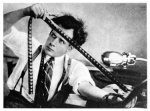Actresses We Lost in 2015 By Brianna Hope Beaton
Tuesday, January 5th, 2016 Since we are in the first week of 2016, I wanted to write something regarding and commemorating some of the actresses that lost their lives in 2015. I would like to begin the new year honoring and showing respect to those who made us smile, laugh, cry, scowl, hide and rejoice. Thank you for all your contributions!
Since we are in the first week of 2016, I wanted to write something regarding and commemorating some of the actresses that lost their lives in 2015. I would like to begin the new year honoring and showing respect to those who made us smile, laugh, cry, scowl, hide and rejoice. Thank you for all your contributions!
Maureen O’Hara, an Irish Actress and singer, passed away on October, 24, 2015 at the age of 95. “Every star has that certain something that stands out and compels us to notice them. As for me I have always believed my most compelling quality to be my inner strength, something I am easily able to share with an audience. I’m very comfortable in my own skin. I never thought my looks would have anything to do with becoming a star. Yet it seems that in some ways they did.”
Catherine Coulson, known for her role as Log Lady, in the 90s show Twin Peaks, passed away from cancer on September 28, 2015 at the age of 71. “I don’t think I really possess the log. I think the log possesses me.”
Silent Film Actress Jean Darling, known for the role of Jean on Our Gang when she was four, passed away on September, 4, 2015 at the age of 93. “The crossover to talkies was just idiocy on the part of the producers.” Judy Carne (Joyce Audrey Botterill), an English Actress best remembered for the phrase “Sock it to me!” on Rowan & Martin’s Laugh-In, passed away on September, 3, 2015 at the age of 76. “Sock it to me!”
Yvonne Joyce Craig, an American ballet dancer and actress best known for her role as Batgirl in the 1960s television series Batman, passed away on August 17, 2015, due to cancer at the age of 78. “I haven’t collected memorabilia. I am not a person who lives in the past”
Amanda Peterson, an American actress known for her role as Cindy Mancini in the 1987 comedy film Can’t Buy Me Love, passed away on July 3, 2015 at the age of 43. “I just love to act. I like to get away, totally play a different character, someone you can get really involved in knowing. I’ve gotten really involved in some characters and written down little summaries of where they live and what their families are like.”
Anne Meara, known for her comedy with her husband, passed away on May, 23, 2015 at the age of 85. “I was glad he got us to be a comedy team, because then we weren’t just waiting for the agent to call, we traveled with our own stuff.”
Mary Ellen Trainer, known for her role as Dr. Stephanie Woods in the Lethal Weapon series, passed away on May, 20, 2015 at the age of 62.
Elizabeth Wilson, known for her Tony award in the play Stick and Bones, passed away on May, 10, 2015, at the age of 94. “Postmodernism refuses to privilege any one perspective and recognizes only difference, never inequality, only fragments, never conflict.”
Ellen Albertini Dow, known for her role in The Wedding Singer, passed away on May, 4, 2015, at the age of 101. “I don’t act up unless the music plays. When I dance, I’m completely different”
Grace Lee Whitney, known for her role as Yeoman Janice Rand on the original Star Trek series from 1966 – 1969, passed away on May, 3, 2015 at the age of 85. “My life is happy, joyous, free, sober and saved, and a lot of fun too. I have a lot of fun”
Suzanne Crough, known for her role as Tracy Partridge on The Partridge Family, passed away on April, 27, 2015 at the age of 52. “If I want something, I go after it.”
Jayne Meadows, known for her versatility for Broadway and the big screen, passed away on April, 26, 2015 at the age of 95. “The best people I know have had a lot of obstacles to overcome.”
Alberta Watson, known for her role as Madeline on the cable series La Femme Nikita, passed away on March 21, 2015, due to cancer, at the age of 60.” If I’ve learned anything in this career it’s that you have to hold on to the wisdom you’ve earned and to use it in your work. I bring an authenticity and experience in my work now that only comes with age and time.”
Anita Ekberg, known for her role in La Dolce Vita, passed away on January 11, 2015 at the age of 83. “I have loved, cried, been mad with happiness. I have won and I have lost”.
Donna Douglas, an American Actress and singer, known for her role as Elly May Clampett in CBS’s The Beverly Hillbillies, passed away on January, 1, 2015, due to cancer at the age of 82. “Back then, it was more or less we couldn’t change a line in our script. We weren’t allowed to change lines. Today, actors change everything and won’t do parts. It’s very different today. Back then, the producers were in charge. Today actors are more in charge.”
Thanks ladies for all your hard work. You will be missed.


















